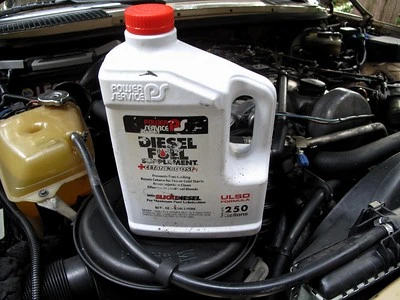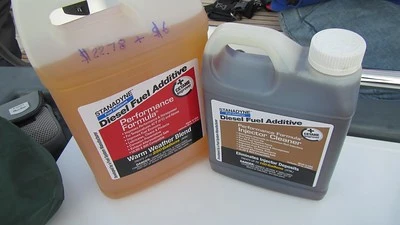
Yes, diesel additives can expire. Most diesel additives have a shelf life of 1 to 2 years, depending on the product and storage conditions. These additives, which might include detergents, lubricity enhancers, and cetane improvers, are usually packaged in bottles or cans. If they are stored in a cool, dry place and kept sealed, they can last longer. However, exposure to air, moisture, or extreme temperatures can reduce their effectiveness over time. It’s essential to check the manufacturer’s recommendations and expiration date on the label to ensure you’re using a product that’s still effective.
Diesel additives come in various types, each with a specific purpose and shelf life. Here’s a breakdown of the common types:
- Cetane Improvers: These additives boost the cetane number in diesel, helping the fuel ignite more easily and improve engine performance. Cetane improvers typically have a shelf life of around 1 to 2 years.
- Lubricity Enhancers: These are used to reduce wear and tear on engine components by improving the lubrication properties of diesel fuel. They usually last for about 18 to 24 months if stored properly.
- Detergents: Detergent additives help keep the fuel injectors and combustion chamber clean by removing deposits. They generally have a shelf life of 1 to 2 years.
- Cold Flow Improvers: Also known as anti-gels, these additives prevent diesel from gelling in cold temperatures. They can be effective for up to 2 years if kept in a cool, dry place.
- Fuel Stabilizers: These additives help prevent the oxidation and degradation of diesel fuel, extending its storage life. They can last for up to 2 years, depending on the brand and formulation.
It’s essential to check the expiration date on the product label, as using expired additives can reduce their effectiveness and potentially harm your engine. Always store them in a cool, dry place to maximize their shelf life.
Read Also: Do Diesel Additives Work in All Types of Diesel Engines?
Signs That Diesel Additives Have Expired

1. Change in Color or Consistency When diesel additives go bad, they often change in appearance. You might notice that the liquid has become darker, cloudy, or has developed particles or sediment. The consistency may also become thicker or more watery than it originally was. These changes can indicate that the chemical composition of the additive has altered, making it less effective.
2. Unusual Smell Expired diesel additives can develop an unusual or off-putting odor. If the additive smells different from when you first bought it, this could be a sign that it has degraded. Chemical reactions or contamination over time can cause these changes in smell.
3. Reduced Effectiveness in Performance One of the most telling signs of expired diesel additives is a noticeable drop in their effectiveness. You might find that the additives no longer improve fuel efficiency, boost engine performance, or prevent fuel issues like they used to. If your vehicle’s engine isn’t running as smoothly or efficiently as expected after using the additive, it might have expired and lost its potency.
Read Also: Are Diesel Additives the Same as Fuel Stabilizers?
Why Using Expired Additives Can Be a Problem
1. Reduced Effectiveness in Improving Fuel Quality Expired diesel additives often lose their potency, meaning they can’t perform their intended functions as effectively. For example, if you’re using a cetane improver to enhance fuel ignition, an expired product might not provide the necessary boost. This reduction in effectiveness can lead to suboptimal engine performance, reduced fuel efficiency, and an overall drop in fuel quality.
2. Potential Harm to the Engine Using expired additives can potentially harm your engine. As additives break down over time, they can form sediments or other unwanted compounds. These degraded components may clog fuel filters, injectors, or other parts of the fuel system, leading to poor engine performance, increased wear and tear, or even damage. In some cases, the use of expired additives can result in costly repairs or maintenance issues.
3. Waste of Money Purchasing and using expired additives is essentially a waste of money. Since these products have lost their effectiveness, you’re not getting the benefits you paid for. Additionally, if expired additives cause engine issues, you might end up spending more on repairs than you saved by using an outdated product. To avoid wasting money, always check the expiration date and store your additives properly to ensure they remain effective.
Read Also: Are Diesel Additives Necessary: The Disadvantages
Shelf Life of Diesel Additives
1. General Shelf Life: 1 to 2 Years Diesel additives typically remain effective for about 1 to 2 years. This means they can maintain their intended properties and functions during this period if stored properly. Beyond this timeframe, the effectiveness of the additives can diminish.
2. Storage Conditions
- Cool, Dry Place: Storing diesel additives in a cool, dry location helps maintain their quality. Heat can cause chemical reactions that degrade the additives, while moisture can lead to contamination or chemical breakdown. A stable, moderate temperature and dry environment are ideal for prolonging their shelf life.
3. Exposure to Air and Moisture
- Air Exposure: When containers are not properly sealed, air can enter and cause oxidation. This chemical reaction can alter the additives’ properties, making them less effective.
- Moisture Exposure: Moisture can lead to contamination or chemical reactions that degrade the additive’s quality. Even a small amount of water can cause significant issues, as it may interact with the additives and reduce their effectiveness.
4. Temperature Fluctuations
- Consistent Temperatures: Diesel additives are best kept at stable temperatures. Fluctuations, such as moving from a hot to a cold environment, can cause chemical instability. This instability can lead to the separation of components or other changes that reduce the additive’s performance. Keeping additives at a consistent, moderate temperature helps preserve their integrity and effectiveness.
In summary, proper storage—away from air, moisture, and temperature swings—helps ensure that diesel additives remain effective for as long as possible, typically up to 2 years.
Proper Storage Tips for Diesel Additives
1. Store in a Cool, Dry Place To maintain the quality and effectiveness of diesel additives, it’s crucial to store them in a cool and dry environment. Heat can accelerate chemical reactions that degrade the additives, while moisture can cause contamination. A temperature-controlled space, like a garage or storage room, is ideal as long as it stays dry and isn’t exposed to direct sunlight.
2. Keep Containers Tightly Sealed Always make sure the containers are tightly sealed after each use. This prevents air and moisture from getting inside, which can cause the additives to oxidize or become contaminated. A properly sealed container helps preserve the chemical stability and effectiveness of the product.
3. Avoid Exposure to Extreme Temperatures Extreme temperatures, whether hot or cold, can affect the quality of diesel additives. High temperatures can cause the chemicals to break down faster, while freezing temperatures can cause separation or crystallization. To avoid these issues, store the additives in a place where temperatures remain relatively stable and within the recommended range specified by the manufacturer. This ensures the additives retain their intended properties and function properly when used.
Frequently Asked Questions
1. Can expired additives damage my engine? Yes, expired additives can potentially damage your engine. As these products degrade, they can form sediments or other harmful substances that may clog fuel filters, injectors, or other parts of the fuel system. This can lead to poor engine performance, increased wear and tear, and even serious damage. It’s best to avoid using expired additives to keep your engine running smoothly.
2. How should I dispose of expired diesel additives? Expired diesel additives should be disposed of properly to prevent environmental harm. Do not pour them down the drain, onto the ground, or into waterways. The best way to dispose of them is to take them to a local hazardous waste disposal facility or a collection event specifically for hazardous materials. Check with your local waste management authorities for specific disposal guidelines in your area.
3. Are there any additives with a longer shelf life? Most diesel additives have a shelf life of 1 to 2 years, but some products might have stabilizers or preservatives that can extend their shelf life slightly. It’s important to check the label or manufacturer’s information for specific details about the shelf life of a particular additive. Additionally, proper storage—keeping the product in a cool, dry place and sealing it tightly—can help maximize the shelf life of any diesel additive. However, always prioritize using fresh products to ensure optimal effectiveness.
To Make a Conclusion
Diesel additives do have a shelf life and can expire, typically lasting 1 to 2 years depending on the type and storage conditions. Proper storage in a cool, dry place, keeping containers tightly sealed, and avoiding extreme temperatures are key to maintaining their effectiveness. Using expired additives can lead to reduced fuel quality, potential engine harm, and unnecessary expenses. Therefore, it’s important to regularly check expiration dates and store additives properly to ensure your engine benefits from the intended performance improvements. Remember, fresh and effective additives are essential for maintaining optimal engine health and efficiency.
While diesel additives are valuable for enhancing fuel quality and protecting engine components, their effectiveness diminishes over time. As these products age, they may undergo chemical changes that reduce their ability to perform as intended, such as improving cetane levels, preventing deposits, or enhancing lubrication.
Using expired additives not only fails to deliver the expected benefits but can also introduce contaminants that harm your vehicle’s fuel system. It’s essential to handle these products with care, dispose of them responsibly if expired, and always use fresh additives for the best results. By being mindful of the shelf life and proper storage of diesel additives, you can ensure that your vehicle runs smoothly and efficiently, safeguarding your investment and extending the life of your engine.
In summary, while diesel additives are a small part of vehicle maintenance, they play a significant role in overall engine performance and longevity. Keep an eye on expiration dates, store them correctly, and replace them as needed to maintain optimal performance and avoid unnecessary complications.
